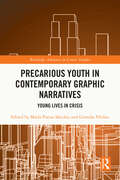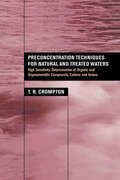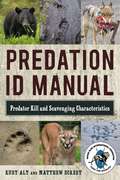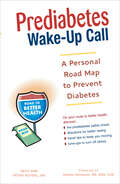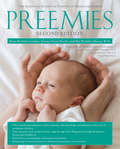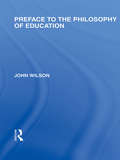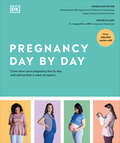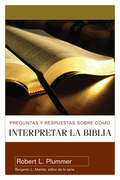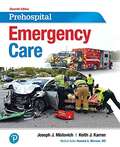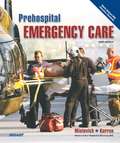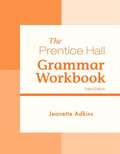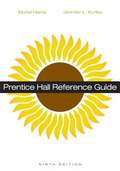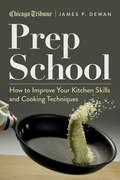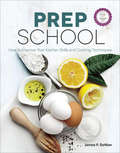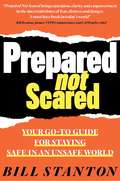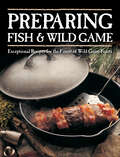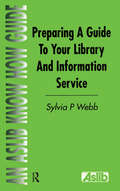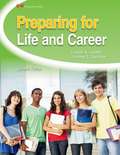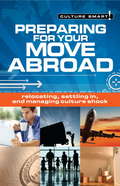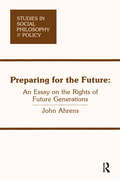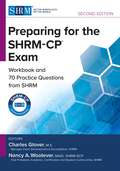- Table View
- List View
Pre-Referral Intervention Manual Fourth Edition
by Samm N. House Kathy Cummins Wunderlich Stephen B. MccarneyGenerally, the pre-referral process begins with a regular educator calling attention to a student with learning and/or behavior problems. A team of educators, typically composed of a special educator(s), a regular educator(s), and/or a counselor(s) from that building, meets with the educator identifying a student for pre-referral intervention. The team, along with input from the teacher calling attention to the student's needs, pinpoints the specific learning and/or behavior concerns for improvement. Goals and objectives for the student in the regular classroom are formally or informally determined, and intervention strategies for the school environment are agreed upon. With consultant assistance from the pre-referral team, the classroom teacher conducts adjusted behavior and teaching approaches for the student for a specific length of time, which may be for several weeks up to a few months. The student's progress is documented and communication continues between the pre-referral team and the classroom teacher. Based on student performance in response to pre-referral intervention strategies, decisions are made as to the student's ability to succeed in the regular classroom with adjustments in instruction, materials, testing, etc. If the student is successful with these adjustments, he/she remains in the regular classroom with continued support. If the student is not successful; formal referral, assessment, and special education services are likely to follow.
Precarious Youth in Contemporary Graphic Narratives: Young Lives in Crisis (Routledge Advances in Comics Studies)
by María Porras Sánchez Gerardo VilchesThis volume explores comics as examples of moral outrage in the face of a reality in which precariousness has become an inherent part of young lives. Taking a thematic approach, the chapters devote attention to the expression and representation of precarious subjectivities, as well as to the economic and professional precarity that characterizes comics creation and production. An international team of authors, young and senior systematically examines the representation of precarious youth in graphic fiction and autobiographic comics, superheroes and precarity, market issues and spaces of activism and vulnerability. With this structure, the book offers a global perspective and comprehensive coverage of different aspects of a complex and multifaceted field of knowledge, with a special attention to minorities and liminal subjects. The comics analyzed function as examples of "ethical solicitation" that bear witness of the precarious existence younger generations endure, while at the same time creating images that voice their outrage and might move readers to act. This timely and truly interdisciplinary volume will appeal to comics scholars and researchers in the areas of media and cultural studies, modern languages, education, art and design, communication studies, sociology, medical humanities and more.
Preconcentration Techniques for Natural and Treated Waters: High Sensitivity Determination of Organic and Organometallic Compounds, Cations and Anions
by T.R. CromptonEquipment used for the analysis of water is frequently insufficiently sensitive to be able to detect the low concentrations of organic and inorganic substances present in samples. Applying preconcentration to the sample prior to analysis means the results gained are more accurate and can be used to report trends more effectively. Each chapter of Pr
Predation ID Manual: Predator Kill and Scavenging Characteristics
by Kurt Alt Matthew EckertPart of the challenges and rewards of being a field biologist is being able recreate a predation event. But that experience is often difficult and frustrating, as time, weather, and other factors can be make clues sparse. Even the most careful of investigators can spend hours of time second-guessing themselves while exhausting every possibility from inconclusive evidence.The Predation ID Manual is designed to help assuage some of those difficulties by providing the reader with practical, expert advice, including:• A step-by-step approach for gathering evidence.• Suggestions of what to focus on at carcass site• A template of terminology to use when classifying a predation• A guide for investigating and determining signs of hemorrhage • Signs of kill and kill sites by species, including deer, elk, and lynx• And dozens more tipsWith a waterproof cover and sturdy pages, the SCIF’s Predation ID Manual is a must have for every serious hunter and field biologist.
Prediabetes Wake-Up Call: A Personal Road Map to Prevent Diabetes
by Beth Ann Roybal Petro RoybalA guide to reversing a prediabetes diagnosis through nutrition, exercise and stress reduction in order to prevent diabetes.With prediabetes at epidemic levels, millions of people are being told by their doctor to take personal action now, before it’s too late. Prediabetes Wake-Up Call provides the newly diagnosed patient with detailed information about the threat of type 2 diabetes while explaining the lifestyle changes that will lower the risk of prediabetes developing into diabetes. Prediabetes Wake-Up Call describes the facts about diabetes and includes assessment checklists and charts to help readers identify areas of relative risk. Then the author details specific strategies to address each risk factor, including weight management, exercise, and food choices, plus less-obvious strategies such as formulating new attitudes towards healthy living. Written for a lay reader, Prediabetes Wake-Up Call offers guidance, sets goals, and provides the reassurance necessary for readers to start getting healthier today.
Preemies - Second Edition
by Dana Wechsler Linden Emma Trenti Paroli Mia Wechsler DoronThe comprehensive "Dr. Spock"-like reference that is both reassuring and realistic--now updated to reflect the many advances in neonatology. P reemies, Second Edition is the only parents' reference resource of its kind--delivering up-to-the-minute information on medical care in a warm, caring, and engaging voice. Authors Dana Wechsler Linden and Emma Trenti Paroli are parents who have "been there." Together with neonatologist Mia Wechsler Doron, they answer the dozens of questions that parents will have at every stage--from high-risk pregnancy through preemie hospitalization, to homecoming and the preschool years--imparting a vast, detailed store of knowledge in clear language that all readers can understand. Preemies, Second Edition covers topics related to premature birth, including: What are your risk factors for having a premature baby? Can you do something to delay early labor? What do doctors know about you baby's outlook during her first minutes and days of life? How will your preemie's progress be monitored? How do you cope with a long hospitalization? Are there special preparations for you baby's homecoming? What kind of stimulation during the first year gives your baby the best chance? Will your preemie grow up healthy? Normal?
Preemies - Second Edition
by Dana Wechsler Linden Emma Trenti Paroli Mia Wechsler DoronThe comprehensive "Dr. Spock"-like reference that is both reassuring and realistic--now updated to reflect the many advances in neonatology. P reemies, Second Edition is the only parents' reference resource of its kind--delivering up-to-the-minute information on medical care in a warm, caring, and engaging voice. Authors Dana Wechsler Linden and Emma Trenti Paroli are parents who have "been there." Together with neonatologist Mia Wechsler Doron, they answer the dozens of questions that parents will have at every stage--from high-risk pregnancy through preemie hospitalization, to homecoming and the preschool years--imparting a vast, detailed store of knowledge in clear language that all readers can understand. Preemies, Second Edition covers topics related to premature birth, including: What are your risk factors for having a premature baby? Can you do something to delay early labor? What do doctors know about you baby's outlook during her first minutes and days of life? How will your preemie's progress be monitored? How do you cope with a long hospitalization? Are there special preparations for you baby's homecoming? What kind of stimulation during the first year gives your baby the best chance? Will your preemie grow up healthy? Normal?
Preface to the philosophy of education (International Library of the Philosophy of Education Volume 24)
by John WilsonIt is sometimes said that the philosophy of education is not a serious and coherent philosophical area of inquiry. John Wilson examines this argument, taking it as the starting point for his book. He believes that most 'philosophy of education' until now has been little more than the promotion of particular ideologies, and that progress can be made only by a more analytical approach. The central problems lies in establishing a few basic concepts, principles and categories and questions which will form the skeleton of the subject. He therefore outlines the nature of 'philosophy of education' and defines some of its major problems by examining key notions such as the value of education, the nature and implications of learning and what should be learned.
Pregnancy Day by Day: Count Down Your Pregnancy Day by Day with Advice from a Team of Experts
by DKDK brings you an all-encompassing and illustrated guide to your pregnancy journey, from the moment of conception to the first two weeks of your newborn's life.Becoming pregnant is a beautiful moment in any person's life, and with this one-stop pregnancy guide by your side, you will be fully-equipped from beginning to end of your joyful journey.With day-by-day artworks and fetal images showcasing your baby&’s development, this comprehensive pregnancy book is perfect for both first-time mums and experienced parents alike. Dive right in to discover: - A day-by-day structure with unmatched detail for every step of the journey.- The day-by-day format is continued for the first two weeks of life with a new-born baby.- An hour-by-hour account of the crucial 12 hours post-delivery.- Illustrated artwork to show fetal development throughout the stages of pregnancy.As your due date approaches, this baby development book explores all the options available for your labour and birth so you can make the right choice with confidence, and also breaks down your delivery and the first 12 hours after childbirth. The day-by-day format continues for the first two weeks postpartum as you embark on life with your newborn.All the latest medical advice for mums-to-be is covered, including guidance on nutrition and exercise, so you&’ll understand how to keep you and your baby happy and healthy throughout pregnancy. Featuring Q&As with both experts and mums also provides extra support, answering common questions and offering reassurance for any questions or concerns you may have about pregnancy, from your pregnancy diet, to the first 40 days, this baby parenting book truly does have it all.The ideal gift for expectant mothers who are seeking a healthy and happy pregnancy every step of the way, and a must-have parenting book for those who seek a detailed account of labour, birth, and exploring all the options available during pregnancy care.With Pregnancy Day by Day by your side, we assure you will feel safe and supported during this special time in your life, as you count down the days to your new arrival!
Preguntas y respuestas sobre como interpretar la BIblia
by Robert L. Plummer Benjamin L. MerkleEl segundo en una serie organizada en un formato de preguntas y respuestas, este libro trata las principales preguntas que estudiantes, pastores y profesores hacen sobre cómo leer y comprender la Biblia. El libro se divide en cuatro partes: primeros pasos, acercamiento general a la Biblia, acercamiento a textos específicos y temas de debates recientes. Este formato accesible permite a los profesores utilizar este libro como un libro de texto y el alumno inquisitivo lo usará para comprender los temas que son más pertinentes para su estudio. Preguntas y respuestas sobre cómo interpretar la Biblia es de lectura obligada para todo estudiante que busca aumentar su conocimiento bíblico, y para el pastor que busca enseñar la Biblia de manera fiel. The second in the series organized around FAQs, 40 Questions About Interpreting the Bible tackles the major questions that students, pastors and professors ask about reading and understanding the Bible. The book is divided into four parts: getting started, approaching the Bible generally, approaching specific texts, and issues in recent discussion. This accessible format allows teachers to utilize this as a textbook and the curious student to understand the issues which are most pertinent to their study. 40 Questions About Interpreting the Bible will be essential reading for the student seeking to advance in biblical studies and for the pastor looking to teach the Bible with confidence.
Prehospital Emergency Care
by Brent Hafen Joseph Mistovich Keith KarrenThe most complete resource for EMT training <p><p> Comprehensive in scope and student-friendly, Prehospital Emergency Care conveys the “WHY” behind the signs and symptoms students observe and the services they provide. Through a solid foundation of pathophysiology, students will learn to quickly identify immediate life threats and deliver excellent emergency care. <p><p> The 11th edition continues to meet and exceed the National EMS Education Standards. It has been thoroughly updated to reflect the latest and best practices for emergency medical services in the US, including conforming to the latest American Heart Association guidelines. Spine motion restriction, naloxone administration, sepsis, stroke screening tools, human trafficking, active shooter, domestic violence, and clinical decision-making with regard to oxygen administration are just a few of the updates readers will discover in this hallmark text.
Prehospital Emergency Care (Ninth Edition)
by Keith J. Karren Joseph J. MistovichA comprehensive step-by-step resource for EMT-B training with case studies, protocols, assessment and emergency care sections. This prepares readers to assess and manage injured people in prehospital environments.
Prentice Hall Grammar Workbook (3rd Edition)
by Jeanette AdkinsThe “Pearson Grammar Workbook” is a comprehensive source of instruction for students who need additional grammar, punctuation, and mechanics assistance. Covering such topics as subject-verb agreement, conjunctions, modifiers, capital letters, and vocabulary, each chapter provides helpful explanations, examples, and exercises.
Prentice Hall Reference Guide (9th Edition)
by Muriel Harris Jennifer L KunkaFor first year composition courses. Prentice Hall Reference Guide , Ninth Edition, is a handbook written to help all writers, including students who may not know proper terminology, quickly find the information they need. Teaching and Learning Experience This text will provide a better teaching and learning experience–for you and your students. It provides: · A series of “portals” in Tab 1, through which students can quickly find the answers to their writing, research, and grammar-related questions: Helps students at all levels of learning locate the help they need. · Tried and true advice at every stage of the writing process from instructors who have over 30 years of combined experience working with students: The text is written to students and speaks to them using language they can understand.
Prep School: How to Improve Your Kitchen Skills and Cooking Techniques
by Chicago Tribune Staff James P. DewanPrep School is the ultimate collection of the weekly Chicago Tribune column of the same name, written by culinary instructor and award-winning food writer James P. DeWan.<p><p> The columns and this book are focused on teaching readers how to become better cooks--from amateurs who are learning to cook for themselves or their families, to professional and gourmet chefs who are searching to perfect their technique. Illustrated with full-color photography and a plethora of simple, plain-spoken instructions, Prep School is an easy go-to guide for becoming more adept to any cooking environment.Prep School is filled with insightful and straightforward tips on knife skills, preparation techniques, pantry essentials, holiday meals, and general advice on how to make your kitchen as user-friendly as possible. Before any home cook or professional chef picks up a cookbook, they should first pick up Prep School and be sure to take DeWan's advice to heart. His recommendations on improving kitchen efficiency and ease, along with his in-depth knowledge of shortcuts and cooking common sense, make DeWan the perfect teacher for any aspiring culinary student.
Prep School: How to Improve Your Kitchen Skills and Cooking Techniques
by James P. DeWanAn IACP Cookbook Award finalist. &“A good primer for beginning cooks and an excellent reference for experienced cooks needing a refresher.&” —ChicagoNow Prep School is the ultimate collection of the weekly Chicago Tribune column of the same name, written by culinary instructor and award-winning food writer James P. DeWan. This compilation is focused on teaching readers how to become better cooks, from amateurs who are learning to cook for themselves or their families to professional and gourmet chefs who are searching to perfect their technique. Illustrated with full-color photography and a plethora of simple, plainspoken instructions, Prep School is an easy go-to guide for becoming more adept at any kitchen skill. Prep School is filled with more than fifty delicious recipes, as well as insightful and straightforward tips on knife skills, preparation techniques, pantry essentials, holiday meals, and general advice on how to make your kitchen as user-friendly as possible. Before any home cook or professional chef picks up a cookbook, they should first pick up Prep School and be sure to take DeWan&’s advice to heart. His recommendations on improving kitchen efficiency and ease, along with his in-depth knowledge of shortcuts and cooking common sense, make DeWan the perfect teacher for any aspiring culinary student. Finalist for 2014 International Association of Culinary Professionals&’ Best Compilation Cookbook Award &“From cooking with booze to conquering crab cakes, reading James P. DeWan&’s column has helped me graduate from cooking like I still live in a college dorm.&” —RedEye
Prepared Not Scared: Your Go-To Guide For Staying Safe In An Unsafe World
by Bill StantonThe ultimate guidebook for protecting yourself and your family from the terrifying dangers surrounding us all written by Bill Stanton, arguably the nation’s most recognized and respected expert in personal security and protection. What do a CIA spy, FBI cyber-security expert, EMT, firefighter, thoracic surgeon, NYPD police chief, pastor, attorney, Secret Service psychologist, and a Special Forces Green Beret have in common? Two things: Like you, they all care about the safety and security of their families. And they all look to Bill Stanton for the practical, life-saving tips and advice that can help them prepare for the worst. In Prepared Not Scared, author Bill Stanton has amassed more than 500 years of combined security experience and advice through his connections with world-class experts in criminology, psychology, military science, self-defense, technology, and emergency preparedness. But Prepared Not Scared is no dense, plodding textbook. It moves rapidly, with dramatic storytelling, fascinating expert interviews, practical street-smart advice, and Stanton’s own brand of no-hold’s-barred humor. Peppered with useful tips, actionable bullet points, and factoids, the book is both an entertaining read and an easy-to-use reference manual that will help you understand and incorporate the advice into your daily life. With each chapter you read, you will increase your chances of protecting yourself from ever becoming a victim of: Child abduction Home invasion Active shooter situations Terrorism Sexual assault Pet injury or abduction School violence Workplace harassment Opioid abuse Drug addition Auto safety and security Cyber crime With Stanton’s help, you’ll also learn how to quickly identify the bad guys and know exactly how to react in potentially dangerous situations. In all, Prepared Not Scared will give you peace of mind and the confidence of knowing that you have all the tools and knowledge you need to survive and thrive in these trying, sometimes, terrifying times. Praise for Prepared Not Scared "The second best thing to having Bill Stanton personally watch your back is to buy his fantastic new book, Prepared Not Scared." —Sylvester Stallone "Prepared Not Scared brings attention, clarity, and empowerment in the uncertain times of fear, distress, and danger. A must-have book in today's world." —Bill Bratton, former NYPD commissioner and LAPD police chief "Prepared Not Scared—the title speaks for itself. Bill brings awareness and an important understanding of how to make changes that can significantly improve our chances in a life-threatening situation." —Dr. Drew Pinsky, board-certified internist, addiction medicine specialist, and media personality "In my career I've reported on shocking crimes—from terrorism to murder cases, kidnappings and beyond—many of which dominated headlines around the world. I've interviewed both perpetrators and victims, and it has always left me with the same question: How could crimes like these have been avoided? Prepared Not Scared provides real answers, giving practical advice on how to stay safe while helping us better understand the way bad guys think. MUST READ." —Megyn Kelly, TV broadcaster "No one wants to be a victim and the best way to keep from becoming one is to know what to do in advance. At Inside Edition, we often rely on Bill Stanton to show our viewers ways to stay safe in all kinds of potentially dangerous situations. Now his readers have a resource to time-tested advice to protect themselves and their loved ones." —Deborah Norville, anchor, Inside Edition "Working and training with friends and Martial Arts icons like Bruce Lee and Chuck Norris, I've spent my life teaching karate and how to best protect oneself. Bill's book does the same. It's like getting a Black Belt for your mind." —Bob Wall, legendary martial arts master, actor, author of Who's Who in Martial Arts
Preparing Fish & Wild Game: Exceptional Recipes for the Finest of Wild Game Feasts
by Creative Publishing internationalA comprehensive guide to preparing fish and wild game for beginner to experienced home cooks with recipes for fish, rabbit, duck, venison and more.A complete guide for demonstrating how to fillet, skin, dress and clean all types of popular fish and wild game. Choose from over two hundred pages of recipes, complete with nutritional information for each one. This book is loaded with great photos and illustrations that inspire you and guide you to the perfect meal.
Preparing a Guide to your Library and Information Service
by Sylvia P WebbDiscusses the choice of information that can be included as well as the different styles in which it can be presented.Covers not just the physical preparation but also distribution and publicity.Selected examples of interesting features.
Preparing for Career Success 2009
by Jerry Ryan Roberta RyanSelf-understanding is the foundation of a planned career choice.
Preparing for Career Success Student Activity Book (3rd edition)
by Jerry Ryan Roberta RyanTogether with the Preparing for Career Success student textbook, the material in the Preparing for Career Success Student Activity Book addresses issues that are important as you prepare for the world of work. From completing a tax form to planning a weekly menu, you have the opportunity to practice important life skills as you think about the career and life issues you face as a young adult.
Preparing for Life and Career
by Louise A. Liddell Yvonne S. GentzlerPreparing for Life and Career gives students the tools they need to develop skills they can use throughout their lives and careers. Teens are challenged to learn how to develop and keep successful relationships, be a good family member, and contribute to their community. The responsibilities of child care, clothing care, and home maintenance--and how to handle them--are also presented. * Organized into 27 chapters presented as short, easy-to-read sections. * New chapter is devoted to transportation options. * Includes many new photos and charts to stimulate interest in learning more. * Interesting questions are posed throughout the text to encourage critical thinking and problem solving. * Common Core activities encourage the mastery of skills needed for college and career readiness. Other chapter activities promote Journal Writing opportunities, Technology applications, and FCCLA participation.
Preparing for Your Move Abroad
by Rona HartThis comprehensive, step-by-step guide is designed to prepare you for your move abroad and to enable you to manage the transition effectively. Alone in the market, it combines the practical, cultural, and psychological aspects of relocation, and helps to allay the fears and reduce the stresses that accompany this major event in a person’s life. Preparing For Your Move Abroadfollows a typical relocation timeline, taking you from your first step – the decision to move – to your integration into the host society, and through every step between these two points. Uniquely it offers: * A strong knowledge base for every stage of the relocation journey * A strategy to manage the issues at hand * Psychological preparation * An action plan, presented through exercises, practical steps to consider, checklists, and many easy-to-use tools It deals with the challenge of change by pulling together the practical, cultural, and psychological aspects of relocation and addressing them at each phase of the process. This distinctive approach helps you to develop three essential skills: systematic organization, cultural flexibility, and psychological resilience. These skills are crucial for successful change management, and can be put to use in any new culture, anywhere in the world. Moving to a new society invariably induces a degree of culture shock – largely the result of “change overload. ”Preparing For Your Move Abroadpresents a tried and tested strategy to help you manage the experience and quickly recover. No other book addresses this phenomenon, or attempts to help readers develop the skills to cope with it. The book aims to turn the challenges of relocation into opportunities for growth. By equipping you with essential knowledge, tools, and skills, it will help you to anticipate what lies ahead, address the challenges presented by your move with clarity and confidence, and make your transition successful, stress-free, and much more enjoyable.
Preparing for the Future: An Essay on the Rights of Future Generations
by John AhrensDoes the present generation have a moral obligation to conserve resources for future generations? Must we accept drastic reductions in our standard of living, and give up the ideals of individual liberty and technological progress in order to preserve the environment? PREPARING FOR THE FUTURE offers an unfashionably optimistic answer to these questions: that future generations cannot have a right to a share of existing resources, because only living persons can have rights. Rejecting the sacrifices that most traditional ethical principles would require of us, it advocates, instead, that members of the present generation may legitimately use all of the resources at their disposal to realize their own values.
Preparing for the SHRM-CP® Exam: Workbook and Practice Questions from SHRM
by Charles Glover and Nancy A. Woolever, editorsEffective exam prep starts with practicing the real thing. This updated, official SHRM Certification workbook includes 70 practice items from previous SHRM-CP® exams to give candidates firsthand experience with the types of questions they'll face in the real exam. Each item includes feedback about correct responses. It also offers guidance about each item's difficulty level indicators to help learners develop smart study and test-taking strategies plus more emphasis on understanding and utilizing the SHRM Body of Applied Skills and Knowledge® (SHRM BASK®).An essential resource for SHRM-CP® candidates, this workbook bridges knowledge and exam readiness through practical, focused preparation to strengthen both content understanding and test-taking confidence.

